Trillions of bacteria live in your gut. When they’re balanced and happy, they protect your health. The only way to tell is with a gut microbiome test.
You might not have heard about gut bacteria (or gut microbiome), but it’s an ecosystem of microbes that live in your colon. They influence your life and health: it’s confirmed by many scientific studies. Let's have a look at how it works and why it's so important for your health.
| Basics: | what is the microbiome and why should you care? |
| Diseases: | gut bacteria protect from five serious chronic diseases |
| Supplements: | find the right probiotics and prebiotics for you |
| Digestion: | discover if your gut microbiome is unbalanced |
| Antibiotics: | track your recovery with a gut microbiome checkup |
| What to eat: | personalised food recommendations to boost your health |
The gut microbiome: it's a new organ
There are trillions of bacteria living on and inside our bodies. In fact, there’s more DNA in your microbiome than human DNA in your body. Gut bacteria do a great job protecting us humans from certain diseases, digesting dietary fibres, and producing vitamins.
Recent studies prove that gut bacteria play an important role in our metabolism and overall health. In fact, they’re so important that scientists even consider the gut microbiome to be a separate organ.
Nowadays, we finally have the technology to check the composition of your gut bacteria - you can even order a microbiome test online and do it at home. Here are the five most important reasons why you need a gut microbiome checkup for your health.
1. Increase protection from obesity, diabetes, and Crohn’s
Did you know that people with obesity, Crohn’s disease, ulcerative colitis, diabetes type 2, and coronary heart disease have different ratios of bacteria in their guts? Studies have shown that people with the same disease have a similar microbiome composition.
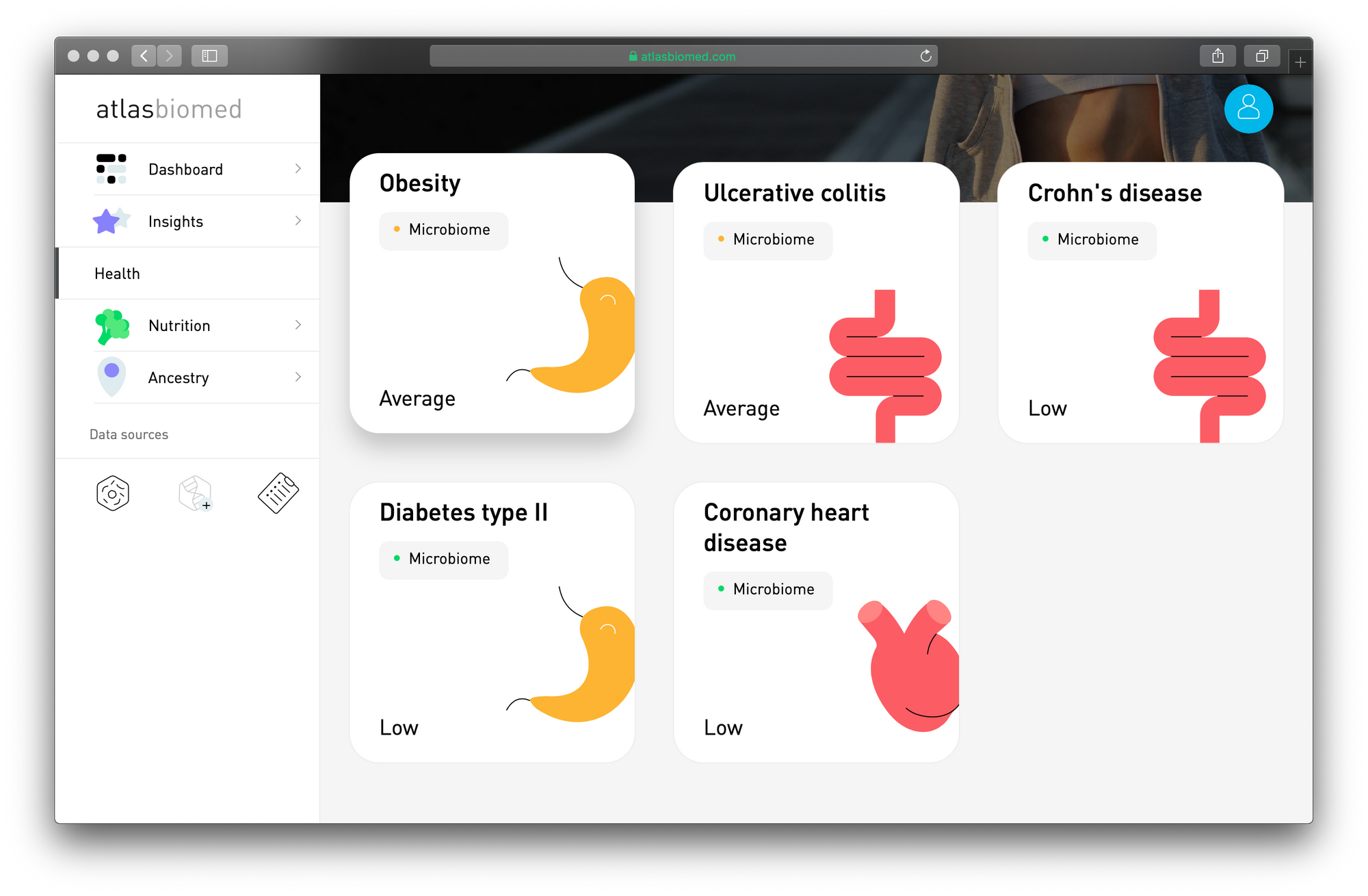
For example, patients with diabetes type II have fewer Firmicutes and lower levels of Akkermansia, Haemophilus, Lactobacillus, and Paraprevotella. When you take a microbiome test, you can see which bacteria are in your gut, and at what levels.
And because scientists have found that people with specific diseases share key microbiome features, we can compare your microbiome profile with the typical traits associated with each disease.
By doing so, it’s possible to tell how well your gut bacteria protect you from it. The fewer similarities there are between profiles, the higher the protection against the disease.
If, on the contrary, a person’s gut flora composition shares key features with the microbiome profile of patients with a disease, this indicates that the microbiome community is not balanced and needs some help.
Microbiome imbalances aren't the only cause of these diseases. There are specific risks and patterns in their emergence, some of which don’t seem remotely linked to gut bacteria at all.
These illnesses were hand-selected by our team of microbiome researchers as having the strongest evidence of reliable and specific gut microbiome features.

Disease protection conferred by bacteria is assessed based on how similar or different your gut microbes are to the gut microbiome of patients with each disease.
Discover your level of protection, take the Atlas Microbiome Test.
2. Take the right probiotics and prebiotics
Probiotics are bacteria that can benefit human health with their activities in the body. The most popular probiotics are certain strains of Lactobacilli, Bifidobacteria, Saccharomyces boulardii, and Bacillus coagulans, but there are also some less famous probiotic strains like E.coli and E. faecium.
There are plenty of probiotic supplements on the market that promise to boost the population of probiotic bacteria in your gut. But with so many probiotic strains to choose from, how do you pick the right one for you?

The Atlas Microbiome Test can help you. It analyses probiotic and beneficial bacteria in your gut microbiome, and it even recommends specific strains of probiotics you can use to boost your gut health. Here’s what you can learn about probiotics from a gut microbiome test:
- Level of probiotic and beneficial bacteria in your microbiome (% of whole ecosystem)
- Comparison with levels in the average population to see where you stand
- Comparison to previous test results to see how you progress (repeat testing)
- Personalised food and supplement recommendations to enhance your probiotic rating
If the test shows you lack one or more probiotic or beneficial bacteria in your microbiome, you'll receive a specific recommendation for which supplement to take.
Our test also provides personalised food recommendations to help boost your beneficial and probiotic bacteria by eating right. Remember though, you should always consult your GP before taking supplements.
3. Solve digestive issues with your microbiome
Gut bacteria are involved in many processes, and digestion is one of them. Imbalanced gut bacteria can cause discomfort, gas, bloating, diarrhoea, and constipation. In fact, gut microbiome imbalances are common in many well-known digestive conditions like Irritable Bowel Syndrome (IBS).
Irritable Bowel Syndrome (IBS): In medical terminology, a syndrome is a collection of symptoms occurring together that characterise a particular condition. Irritable bowel is the name given to a specific set of symptoms when testing can’t find any identifiable cause for your digestive problems.
IBS is characterised by low-grade chronic inflammation, worsened by factors like stress, poor diet, and gut microbiome imbalances. Symptoms can vary from patient to patient: some people have a dominant of diarrhoea, others constipation, and some people may have both (mixed type).
Research into the gut microbiome indicates that specific bacteria may contribute to IBS-Constipation type. For example, Methanobrevibacter Smithii can produce methane, a gas known to slow the movement of stool through your intestines.
Interestingly, people with IBS-Diarrhoea or IBS-Mixed types may have lower levels of methane-producing bacteria in their gut. Research also indicates that they may have lower populations of microbes that produce butyrate.
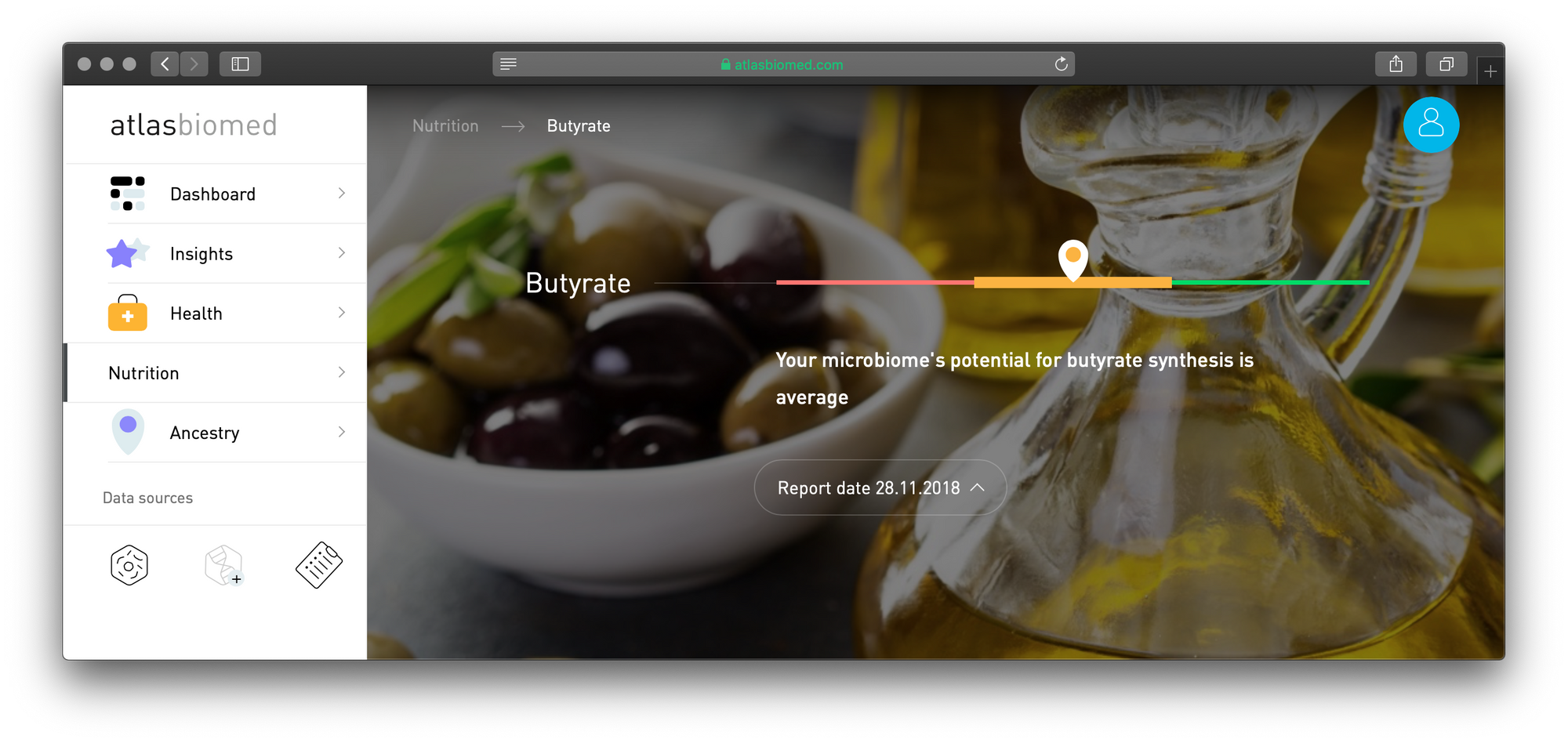
Butyrate is a very important short-chain fatty acid for the human gut because it provides up to 90% of fuel for the cells of the gut lining. It also helps maintain the integrity of the intestinal barrier and prevent inflammation.
Inflammatory Bowel Disease (IBD): Inflammatory bowel disease is now considered an autoimmune condition - the body’s immune system reacts abnormally to specific triggers (foods, stress episodes, smoking, alcohol, etc.).
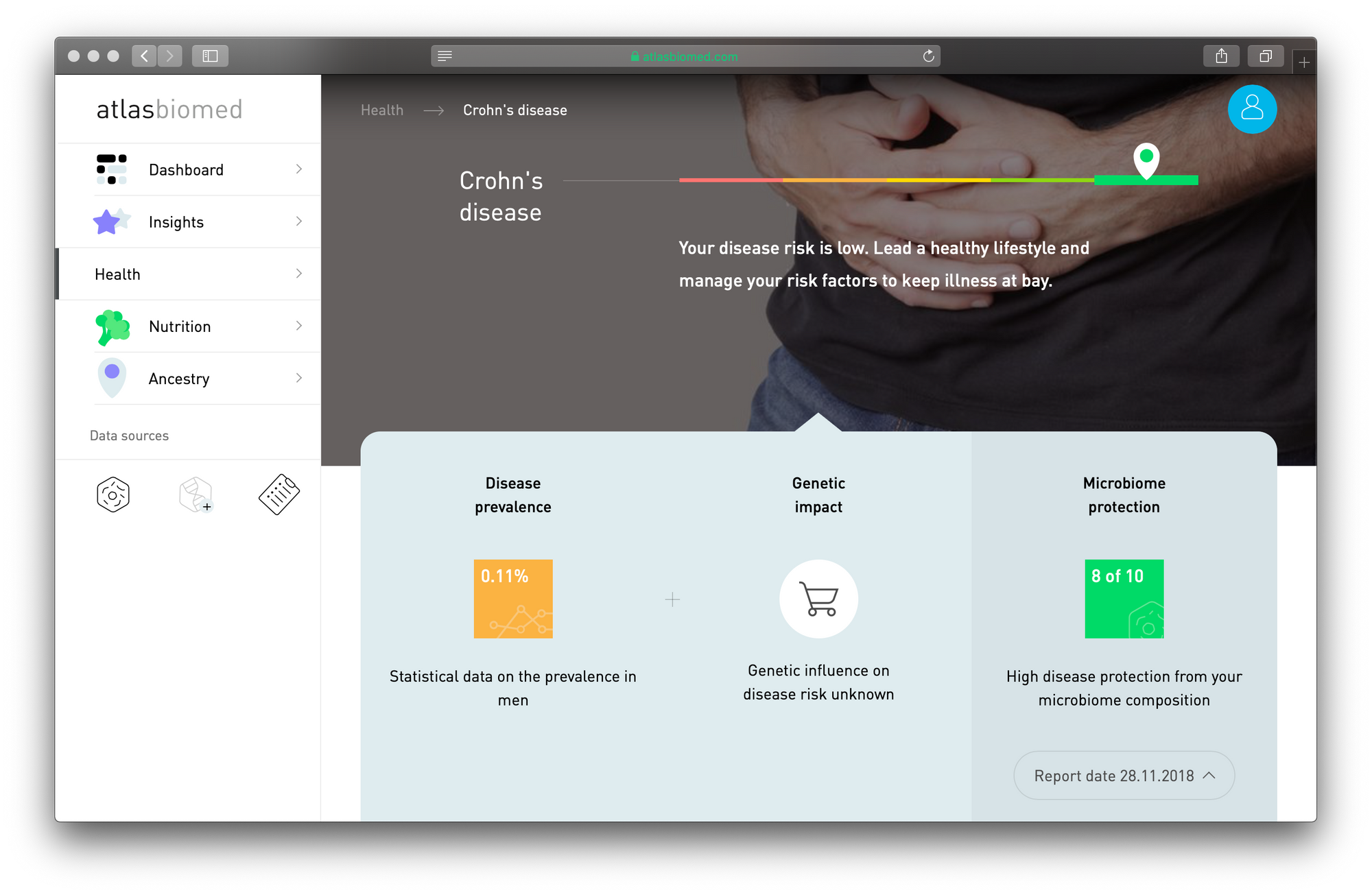
Crohn disease can affect any part of the digestive tract, and lesions can appear anywhere from the mouth to the rectum. However, it is most commonly found in the small intestine.
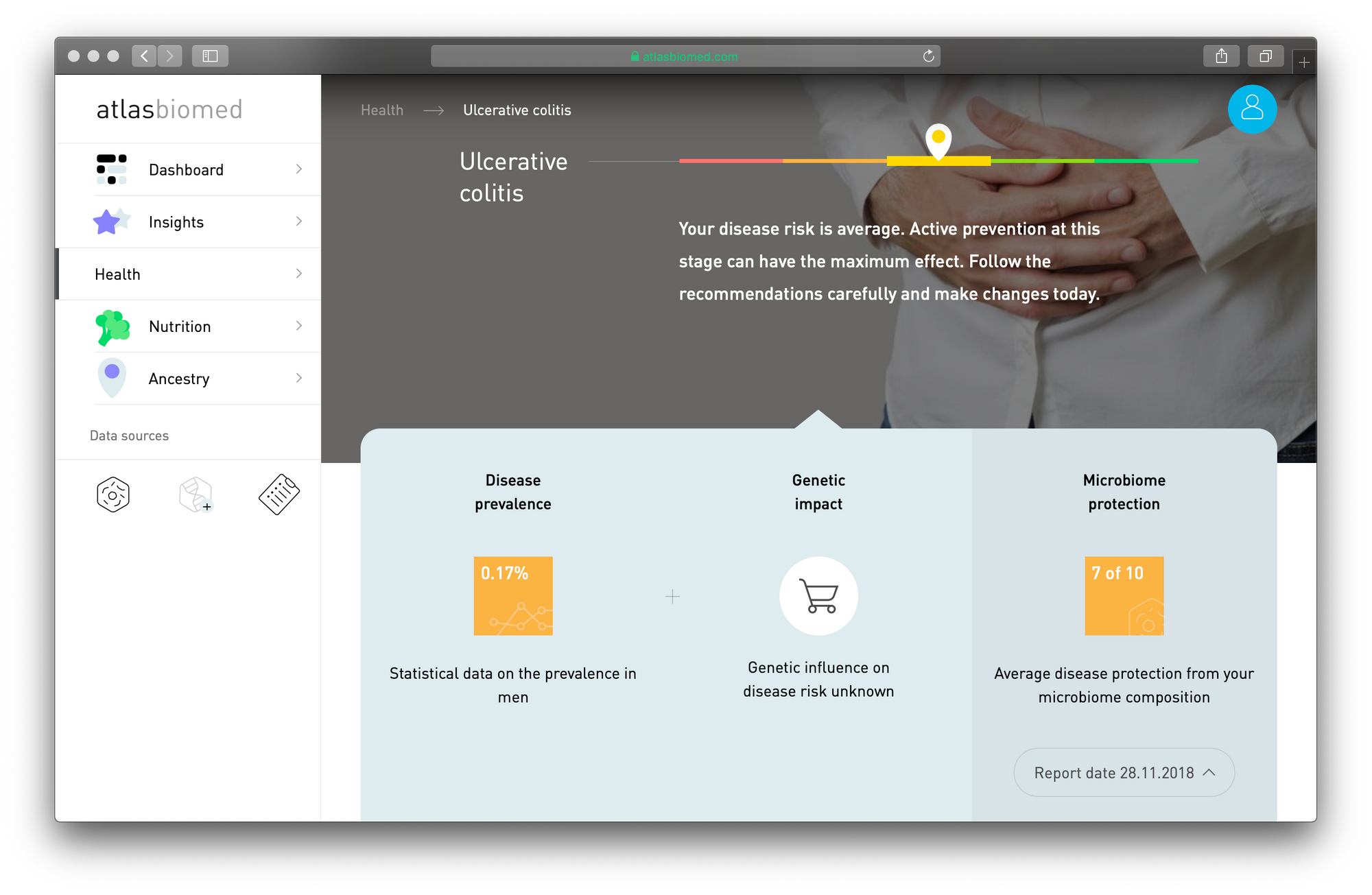
Ulcerative colitis only affects the colon (large intestine), home to your gut microbes, and also the location where your body forms poop - and poop is an important indicator of how well you are digesting food.
The Atlas Microbiome Test shows your protection from ulcerative colitis and Crohn’s disease, as well as levels of butyrate-producing bacteria.
4. Check your gut bacteria after antibiotics
There are two types of antibiotics: broad spectrum and narrow spectrum. Broad-spectrum antibiotics affect many different types of microorganisms indiscriminately (good or bad), but narrow-spectrum antibiotics only affect specific strains.
Antibiotics act differently on the gut microbiome depending on how they enter the body. Oral administration is much more likely to cause antibiotic resistance than intravenous administration (through a vein).
How the microbiota responds to antibiotic treatment also depends on individual characteristics of the patient like age, lifestyle, and composition of gut bacteria. For example, studies show that antibiotic treatment in newborns and infants can affect the development of a diverse and balanced microbiota.

Research now indicates that the microbiome starts to develop when the baby is still in their mother. If a pregnant mother is treated with antibiotics, it may affect this essential step too.
We recommend taking the Atlas Microbiome Test three months after a course of antibiotics to see how the gut microbiome is recovering, and to get more personalised and accurate food recommendations to help. If you’ve taken the test before a course of antibiotics, you will even be able to compare what your microbiota looked like before and after!
5. Science-backed personalised foods
After you’ve taken the test, you’ll know how good your gut bacteria are at protecting you from diseases, but also digesting dietary fibres present in your food, not to mention their ability to produce various vitamins and butyrate. You’ll also get full information on its diversity and levels of probiotic and beneficial bacteria.
These foods are called prebiotics, and our database has more than 150 specific foods to work from. Every week, our algorithm calculates which 10 foods you need to add to your diet to boost your gut microbiome health. You can use our mobile app to track and tick off the foods you’ve eaten each week!
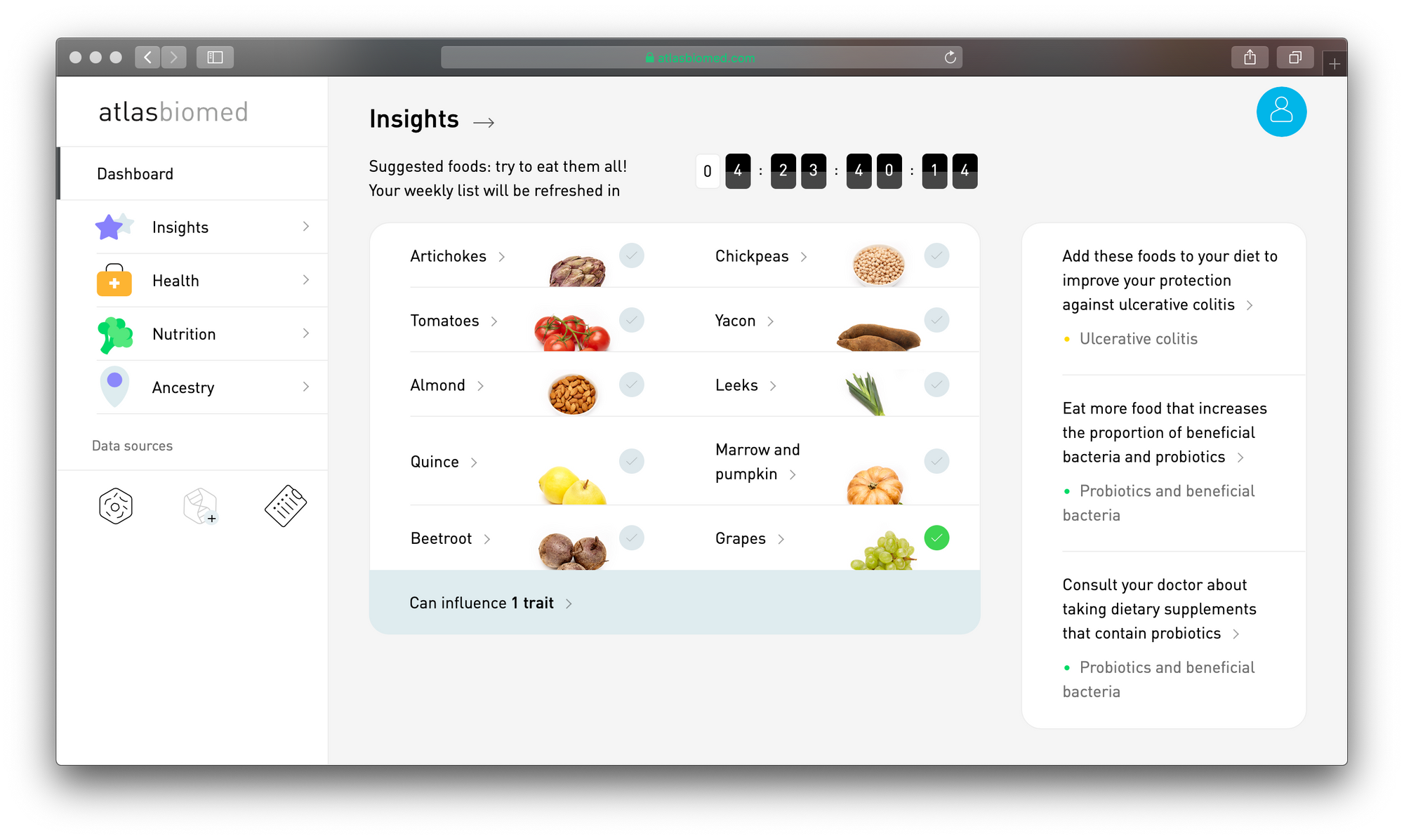
By following weekly personalised eating recommendations, you can increase the abundance of beneficial species that help maintain a stable and healthy microbiome environment.
Did we mention that we regularly add new features to the test results, including new foods and traits? These updates are free of charge to people who have already taken the test.
In the future, microbiome research will not only identify patterns in the make-up of the gut microbial ecosystem, but possibly find new means to diagnose and treat disease too.

At-home options like the Atlas Microbiome Test can help you identify health risks linked to the microbiome and take small and easy steps to improve your wellbeing and prevent illness.





















